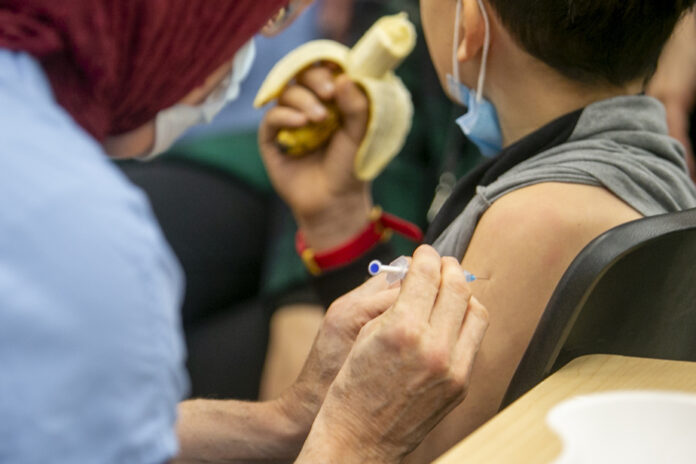(Ottawa) The COVID-19 pandemic was not even six months old and no vaccine had been approved for any use when Justin Trudeau promised in Montreal that the National Research Council of Canada would be able to start producing million doses by the end of 2021.
Nearly 1,000 days later, the NRC has still not produced a single dose for clinical use. But that day is not far away.
Earl Brown, virologist and professor emeritus at the University of Ottawa, recalls that it was completely utopian to think of being able to build a new vaccine factory in less than two or three years – imagine a year.
But if a new coronavirus pandemic were to hit the world, Canada today would be in a much better position to manufacture its own vaccines and drugs, he says.
When Canada negotiated contracts for the purchase of the first COVID-19 vaccines in the summer of 2020, Anita Anand, then Minister of Supply, asked each company if it could manufacture its doses in Canada. All said no.
Ms. Anand, who is now Minister of Defence, explains that the pharmaceuticals have all concluded that Canada’s biomanufacturing capacity “was too limited to justify the investment in capital and expertise necessary to launch manufacturing in Canada”.
Between May 2020 and April 2022, Canada pledged more than $1.3 billion for 12 new or expanded factories to manufacture vaccines and antibody treatments. Most are still under construction, but Innovation Minister Francois-Philippe Champagne said Friday that things were progressing at a good pace.
When he took office in January 2021, Champagne said Canada had the capacity to produce or at least complete production of about 30 million doses of vaccines per year.
GlaxoSmithKline manufactured seasonal flu vaccines at its plant in Sainte-Foy, Quebec. Sanofi Pasteur filled vials with polio vaccine in Toronto, but the vaccine itself was made in Europe. Most other common vaccines, such as the measles, mumps, and rubella vaccine, are imported.
Sanofi is one of 12 companies currently expanding production capacity. In March 2021, it received $415 million from Ottawa and $55 million from the Ontario government to build a flu vaccine factory on its Toronto campus by 2026.
According to Mr. Champagne, all of these new projects will allow Canada to produce nearly 600 million doses per year, but most of them will not be completed for one to three years.
The new NRC Biologics Production Center in Montreal is one of the few to be ready to manufacture vaccines this spring, at the rate of two million doses per month. But he has none to produce.
The brand new Novavax factory, worth 126 million, was built in June 2021, slightly within the timeframe proposed by Mr. Trudeau. It took an additional 14 months to obtain a license from Health Canada to manufacture vaccines.
But Maryland-based Novavax said in February it may not be able to survive. It took too long to get its COVID-19 vaccine to market and lost the race to Pfizer-BioNTech and Moderna.
NRC said it was up to Novavax to comment on the status of its production plan in Canada. The company has not yet responded to La Presse Canadienne.
Patricia Gauthier, Moderna’s managing director in Canada, said the company is currently building factories in Canada, Kenya, Australia and the UK. She added that the Canadian factory, in Laval, is being built very quickly.
Announced just over a year ago, the site was chosen last summer and construction began in November. Now, she says, doses are expected to start rolling off the production line by the end of next year.
Health Canada’s authorization process will determine when doses for patients will be ready, but Gauthier said she hopes they will be ready in late 2024 or early 2025.
The plant should be able to produce up to 100 million doses of its original COVID-19 vaccine annually, or 200 million booster doses. The company also plans to manufacture its respiratory syncytial virus and influenza vaccines there, although none have been licensed yet.
Ottawa did not make a direct financial contribution to Moderna for the construction of the plant in Laval. On the other hand, he concluded an agreement for the purchase of the vaccines which will leave the production lines.
The only project on the list that is in danger of failing completely is the Medicago production site in Quebec. The company received $173 million from Canada in 2020 to advance its COVID-19 vaccine and build a new production facility.
Its Covifenz vaccine was successfully tested, but because the company was partly owned by tobacco giant Philip Morris, the World Health Organization refused to consider its application for licensing.
Health Canada approved the vaccine and Canada paid for 20 million doses, but Canada’s current supply of the COVID-19 vaccine is entirely supplied by Pfizer-BioNTech and Moderna. Without WHO clearance, Medicago could not obtain permission to use the vaccine elsewhere in the world.
Philip Morris sold his share of the company in December, but in February the sole remaining owner, Japanese company Mitsubishi, said it was winding down Medicago’s operations.
Champagne said Friday that he had spoken to Quebec City Mayor Bruno Marchand about the issue this week and hoped to find a new partner to at least salvage the research being done by the company.
Medicago was the only company in the world to produce a plant-based vaccine. Mr. Champagne did not say whether Canada had a chance of recouping its investment if the company disappeared altogether.
Quebec Economy Minister Pierre Fitzgibbon admitted in February that there were not many potential buyers for the Medicago plant because otherwise Mitsubishi would have sold it. “There are very few people in the pharmaceutical field,” he said.















